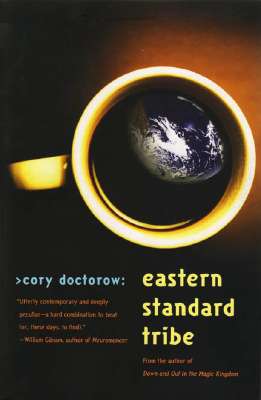

| Cory Doctorow is co-editor of the weblog BoingBoing and also has his own web site. | ||
| Click on a book's image or title to order from Amazon.com |

Eastern Standard Tribe
Tor, TPB, © 2004, 221 pp, ISBN #0-765-31045-7Reviewed June 2005
In the near future, "tribes" of individuals from different time zones are engaged in an ongoing struggle to economically best each other. Individuals in a given time zone share the same outlooks and ethos and so are natural allies against competition from other time zones. Art Berry is a member of the Eastern Standard Tribe, and is assigned to London with his co-conspirator Fede. They're ostensibly contractors with a European company, but in fact they're trying to undercut that company in bids against EST companies. Art meets the love of his life, Linda, by running over her when she steps in front of his car on a dark night. Despite this rocky beginning they start a relationship.
We know from the outset that things haven't ended up well, as parallel with the London narrative is a narrative with Art stranded on the roof of a mental institution in Massachusetts to which he's been committed. How he got there, and where he goes from there, comprises the bulk of the story.
Eastern Standard Tribe has a really nifty idea - competition among tribes, and what comprises a tribe - which seems rife with possibilities. But it's really an extremely marginal element of the book, and it's broadly suggested that Art is pretty much imagining the whole concept of tribes, that at best they're just another wacky notion that a few obsessive people on the Internet buy into. This is tremendously disappointing, and there really isn't a whole lot to the book beyond that idea, unfortunately. Just some relatively mundane philosophizing about some contemporary technological issues (such as digital rights management).
Art is sort of amusing as a character, since he's introduced as having been "born to argue". The scenes where he turns on his argumentative skills to dazzle the rubes are the most entertaining of the book. Otherwise the book's characters are pretty thoroughly unlikable; Fede and Linda are fairly generic nutjobs, and the few other characters are one-dimensional. The annoying tendency of characters to repeat a word several times ("Art, Art. Art. Art. Art.") makes them all seem mentally defective somehow (though I guess it's supposed to make them seem patronizing towards Art).
The book is basically about Art being betrayed by everything he believes in, although the justifications for his belief are pretty thin so it's hard to feel sorry for him. He seems like a shlub for holding those beliefs. Additionally, his ultimate redemption seems rather contrived and unearned. So I came out of the book wondering what the point was. It claims it's asking the question, "Is it better to be happy or smart?" Since no one in the book seems particularly smart - just sort of self-centeredly clever - the question seems moot.
So overall I didn't find a lot to like here. If it had taken the tribes idea more seriously and explored it in depth then there was some potential there. But it ends up being a rather superficial story of betrayal, and just isn't a whole lot of fun.
hits since 13 June 2005.